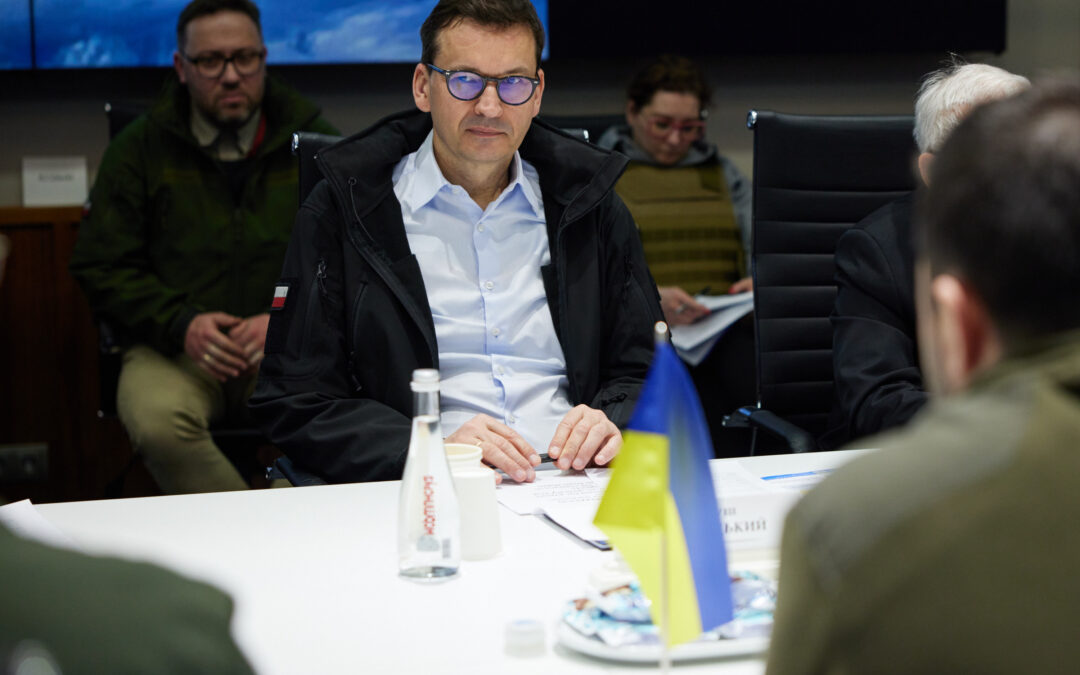Two thirds of people in Poland positively assess the government’s actions on the international stage during the war in Ukraine, shows a new poll, which finds that approval is relatively strong even among opposition voters.
The findings, from an IBRiS poll for the Rzeczpospolita daily, show that nearly 65% of respondents evaluate the government’s international actions in relation to the war as good (50.6%) or very good (14.3%). Just under 30% view them as bad (22.7%) or very bad (6.9%).
Among those who identify as supporters of the ruling camp, there is almost universal (97%) approval. But even among opposition voters, positive (49%) and negative (49%) assessments are evenly balanced. Among undecided voters, approval (64%) far outweighs disapproval (12%).
Sondaż: Polacy dobrze oceniają działania rządu w związku z wojną na Ukrainie https://t.co/2lDsV75Q4k pic.twitter.com/0jCeSqdWGh
— Grzegorz_P (@Grzegorz_Palis) April 12, 2022
Poland has been one of Ukraine’s most vocal allies since the beginning of the war. Warsaw has repeatedly called on the EU to impose harsher sanctions on Russia and has moved to introduce some of its own ahead of its European partners, as well as to end all Russian energy imports this year.
The Polish government has supported Ukraine’s ambitions to join the EU, and last month Prime Minister Mateusz Morawiecki and his Czech and Slovenian counterparts became the first foreign leaders to visit Kyiv since Russia’s invasion.
Warsaw has also pushed for a tough military response to Moscow’s aggression. It has provided equipment to Ukraine, sought to strengthen NATO’s presence on its eastern flank, and passed a law boosting defence spending to 3% of GDP.
Poland has also received the majority of refugees from Ukraine, with around 2.7 million people crossing its border since Russia’s invasion. Morawiecki this week called on the EU to provide funds to help Poland deal with the influx.
However, some opposition politicians, including Warsaw mayor Rafal Trzaskowski, say that much of the weight of helping refugees has fallen on local authorities, NGOs and individuals. They have accused the government of failing to provide enough support.
Analysts quoted by Rzeczpospolita say respondents in the new poll may be judging the overall level of help, not differentiating between what tasks are carried out by the government and what help is provided by local authorities or by NGOs.
Ze spontanicznego, narodowego zrywu koordynowanego przez samorządy, musimy przejść do etapu przemyślanej integracji i długoterminowej pomocy dla gości z Ukrainy. Do tego potrzebujemy zarówno wsparcia finansowego, jak i systemu międzynarodowego, o który apeluję od wielu tygodni. pic.twitter.com/0o8ypVEW2t
— Rafał Trzaskowski (@trzaskowski_) April 6, 2022
The ruling national-conservative Law and Justice (PiS) party has seen a rise in its polling numbers since the outbreak of war, with its level of support going from 37% to 40%, according to an average of polls compiled by Politico Europe.
But the experts cited by Rzeczpospolita are sceptical as to whether PiS will be able to translate approval of government policies relating to the war into political support during the general election scheduled for next year.
“The government’s next decisions will be increasingly difficult and will not build support for the party,” said Anna Materska-Sosnowska, a political scientist at the University of Warsaw. “Hospitable Poles will need significant government aid support, and the PiS government is not prepared for the next steps of helping Ukrainians.”

Alicja Ptak is deputy editor-in-chief of Notes from Poland and a multimedia journalist. She has written for Clean Energy Wire and The Times, and she hosts her own podcast, The Warsaw Wire, on Poland’s economy and energy sector. She previously worked for Reuters.




















